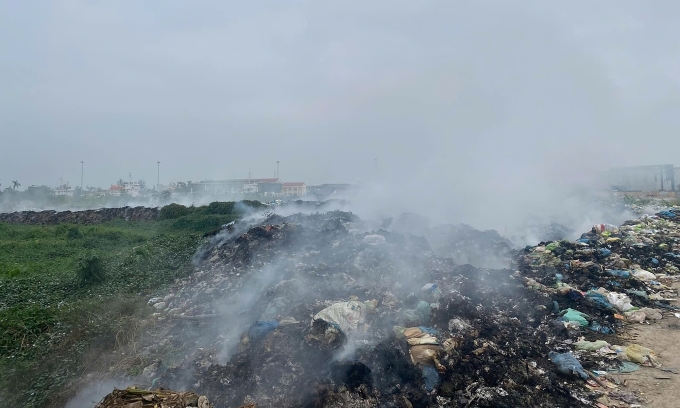Northern Vietnam’s rural areas grapple with air, water, and soil pollution
The 2023 National Environmental Status Report on Rural Environment, released Wednesday by the Ministry of Natural Resources and Environment, assessed air quality in rural areas—home to over 61 million people—as generally good. However, localized pollution hotspots were identified.
Air pollution hotspots
Monitoring results reveal that northern rural areas have experienced periods of severely degraded air quality, with fine dust (PM 2.5) levels exceeding regulatory limits by up to 3.5 times at some stations. Northern regions consistently report higher pollution levels than the central, Central Highlands, and southern regions. Within each region, air quality varies based on the location of emission sources.
Garbage is burned in Kinh Mon Town of Hai Duong Province, November 2024. Photo by Read/Le Tan |
Craft villages are among the most polluted rural areas. Monitoring at Lai Xuan Village (Thuy Nguyen District, Hai Phong), Phong Khe and Van Mon (Bac Ninh), and Ninh Van (Ninh Binh) showed suspended dust levels nearly double the standard in some locations. At Van Mon station near the aluminum casting craft village of Man Xa in Bac Ninh Province, PM10 and PM2.5 fine dust levels have consistently exceeded standards since 2020.
Industrial zones, including Phong Khe 2 and Lo Sung (Bac Ninh) and Tang Loong (Lao Cai) in northern Vietnam, and Phong Phu (Tra Vinh) in southern Vietnam, also contribute significantly to pollution. PM2.5 levels near these zones have surpassed regulatory limits annually since 2021.
Mineral extraction zones in the northern provinces of Lao Cai and Phu Tho, the central hub Da Nang, and the Mekong Delta’s Vinh Long Province have reported suspended dust levels exceeding standards by 1.1 to 2.2 times.
Deteriorating surface water quality
The report highlighted that while surface water in rural areas remains usable for aquaculture and irrigation in many places, some areas have shown signs of pollution and deterioration.
Agricultural and livestock wastewater is a major contributor to surface water pollution. In 2023, monitoring of 387 agricultural production samples in Hanoi revealed 180 instances of biochemical oxygen demand (BOD) pollution, 229 of chemical oxygen demand (COD), and 288 of nitrite pollution, among other contaminants.
Northern rivers such as the Ngu Huyen Khe, Cau, and Nhue also face significant pollution, with levels of suspended solids (TSS), COD, BOD5, ammonium, and coliform frequently exceeding standards. For example, water quality at Dao Xa on the Ngu Huyen Khe River and sections of the Nhue River in Hanoi ranges from poor to very poor.
Nhue River that flows through Hanoi and its environs is polluted in October 2023. Video by Read/Ngoc Thanh
In the central coastal and Mekong Delta regions, aquaculture and seafood processing wastewater have overwhelmed natural water purification capacities. In Ca Mau Province, 11 of 14 monitored aquaculture sites failed to meet standards for dissolved oxygen (DO), ammonium, or phosphorus.
Soil pollution risks
Industrial waste and farming practices have led to significant soil pollution in several areas. Near the Lam Thao Chemical Plant in Phu Tho Province, Phu Bai Industrial Zone in Binh Dinh, and Lien Chieu Industrial Zone in Da Nang, agricultural land shows heavy metal contamination (Cu, Pb, Zn, Cd, Hg) exceeding standards by 1.1 to 1.8 times.
Intensive farming has also contributed to soil acidification, declining organic matter, phosphorus eutrophication, nitrate pollution, and residual pesticides. In addition, activities in craft villages and improper disposal of plastic waste further threaten soil quality.
The National Environmental Status Report, published biennially by the Ministry of Natural Resources and Environment, provides detailed assessments of air, water, and soil quality. This year’s findings underscore the urgent need for sustainable environmental management to safeguard the health and livelihoods of rural communities in Vietnam.



Comments are closed.